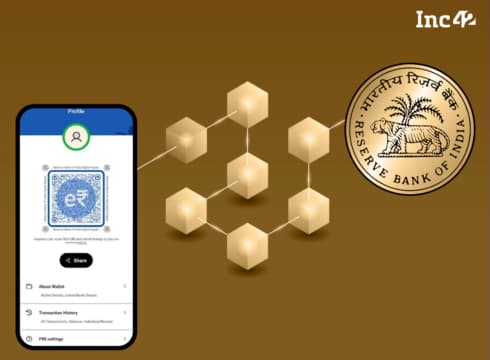India’s CBDC retail is based on permissioned blockchain architecture and has deployed hyperledger framework for the same
The National Payments Corporation of India (NPCI) is building the platform for both retail and wholesale CBDCs
Currently, SBI, ICICI, IDFC First, YES Bank, Kotak Mahindra Bank, Bank of Baroda, Union Bank of India, and HDFC Bank are offering CBDC-retail services to selected users
Inc42 Daily Brief
Stay Ahead With Daily News & Analysis on India’s Tech & Startup Economy
Five more banks – Axis bank, Canara Bank, Punjab National Bank, Federal Bank and IndusInd Bank – are expected to join the digital Rupee-Retail (e₹-R) pilot in the next three months, sources close to the development told Inc42.
Currently, SBI, ICICI, IDFC First, YES Bank, Kotak Mahindra Bank, Bank of Baroda, Union Bank of India, and HDFC Bank are offering CBDC-retail services to selected users.
Earlier this month (February 8), RBI’s deputy governor T Rabi Shankar said, “In retail CBDC, there are more than 50,000 users now and over 5,000 merchants. There are eight banks that are facilitating this. We are planning to add five more banks. Over time, we plan to extend this to all major banks. There are five cities in which it is being done now. We are going to add another nine cities, and we will be increasing that gradually. The total number of transactions, a couple of days back, was roughly around 7,70,000.”
However, the names of the five banks were not revealed in the press conference.
On the total value of transactions, the RBI deputy governor had earlier said, “I do not have the exact fixed amount, but these are small-value transactions. We want the process to happen gradually and slowly.”
CBDC-R: What’s In The Tech
Two months on, and the RBI is yet to disclose the technical details of the pilot project. However, two independent sources have confirmed that India’s CBDC retail is based on permissioned blockchain architecture and has deployed a hyperledger framework for the same.
“The wholesale CBDC will also be tested on permissioned-blockchain architecture,” the sources added.
The RBI has not come up with a timeline, and the plan has been to go slow in order to fix the bugs as and when they come. Thus, the pilot testing time period has not been fixed. But, the RBI is accessing the feedback, response and scalability of these solutions.
The RBI has formed a five-member technical advisory committee to supervise the entire project, while the National Payments Corporation of India (NPCI) is building the platform for both retail and wholesale CBDCs.
What’s Next
The RBI plans to use CBDC retail to penetrate into areas where the UPI has not been popular. The first one is offline payments, where cash is still king.
If the RBI allows, CBDCs can even go into the hands of people who don’t have accounts. Take, for example, gig workers, who can be paid digitally sans a bank account, which isn’t the case with the UPI.
Further, CBDCs are expected to bring their own flavour of anonymity, privacy and agility in the way cash transactions are done in the country.
The RBI has also planned to include DeFi, or defi-related, services, allowing more people to join the consortium and run their own financial services together on a shared infrastructure. Right now, people are looking at crypto to solve all such use cases. If the RBI could offer these features with its CBDC, one can achieve this easily by adhering to all regulations.
Lastly, cross-border payments are another area that the RBI could explore, sources said. This is because, unlike some other international projects such as the central banks of Israel, Norway, and Sweden, where the trio have teamed up to explore how CBDCs can be used for international retail and remittance payments, India is yet to join other countries.
{{#name}}{{name}}{{/name}}{{^name}}-{{/name}}
{{#description}}{{description}}...{{/description}}{{^description}}-{{/description}}
Note: We at Inc42 take our ethics very seriously. More information about it can be found here.


